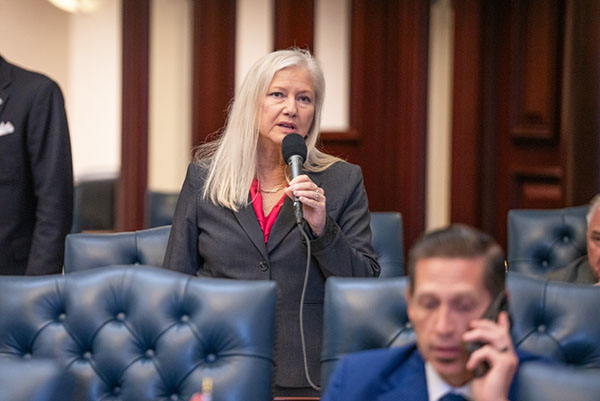
First-year State Rep. Anne Gerwig (R-District 93) helped roll back one attempt by Tallahassee to dictate school start times to local governments but wound up voting for a statewide ban on fluoridation in drinking water, an additive process she supported during her time as Wellington’s mayor.
“Sometimes you vote for things you don’t agree with 100 percent,” Gerwig said, reflecting this month on a legislative term that ended June 16 and was not always filled with easy choices.
The fluoride ban was part of a larger agricultural bill, and she listened to arguments that maybe municipalities don’t need to be adding much of anything to drinking water at this stage. Amid renewed debates, data showing it helps prevent cavities ran into skepticism it could harm children in other ways.
“I’ve always been a strong believer in fluoridation, and I did share with other representatives how it was very well supported in my community,” she noted. “At one point, surveys showed it was supported by two-thirds of residents.”
The bill does not explicitly mention fluoride but effectively bans it by restricting additives to water supplies. It passed the Florida House of Representatives 88-27, and the governor’s signature made Florida the second state after Utah to impose a state fluoride ban.
Gerwig served as house sponsor on a measure that let districts opt out of mandated later start times for middle and high school students by 2026 with the idea they could get more sleep. She argued it was well-intended but adversely affected after-school activities, including academic-enhancement and athletic programs, along with bus schedules. She helped shape the language in a Florida Senate version that ultimately passed both chambers by wide margins.
Gerwig did get a disapproving letter from a village resident saying it was hard enough to see that older students get enough sleep, she said, but the biggest support came from teachers who had their own children. They backed her efforts.
“It was going to be a real problem,” she said.
Another bill she passed as the sponsor was HB 259, which recognizes Aug. 21 as “Fentanyl Awareness & Education Day” and encourages outreach and sponsored events by schools and community organizations.
“Wellington was kind enough to allow me to record a public service announcement,” Gerwig noted.
Explaining why she filed the bill, Gerwig wrote in an online statement, “Some lives are lost due to unintentional exposure, including babies, young children and public servants who come into contact with this drug. The pain of addiction and the loss of lives due to fentanyl touches almost every family. Bringing awareness of the dangers and hope for those who need it can change lives. By bringing attention to the fact that almost 60,000 lives were lost to fentanyl last year, we can spread awareness of this deadly crisis.”
Gerwig also voted for a bill that increased costs and potential criminal penalties in gathering signatures for statewide ballot initiatives. Current Wellington Mayor Michael Napoleone called it a “terrible law” that makes it more difficult to give voters a chance to have a direct say on issues from abortion to recreational marijuana use.
Gerwig said she questioned how many initiatives are truly “grassroots” efforts, as opposed to agenda-driven moves by large companies or advocacy groups. But she’s willing to assess if the law is overly restrictive, she said.
“We can take a look as time goes on,” Gerwig said.
In other action, she is proud of her work in an education-related committee to help restore some funding for programs designed to help students pursue Advanced Placement credits, amid some skepticism about how effective the projects were.
Were there any lessons learned from the session that stood out? There were.
One was underestimating the importance of state legislative staff in crafting bills and getting more attention for measures that did not seem to get much traction.
One bill she pushed would make it easier for families to gain access to new therapies for rare childhood diseases, but it got bogged down. Next time she will go to staff much faster for help, she said.
“I just realized how much I needed to help staff understand it,” she said.
Gerwig narrowly unseated former State Rep. Katherine Waldron, a Democrat, last November.
Her caucus gave her a standing ovation for flipping her state legislative district to Republican heading into the session, but she expects nothing less than a concerted effort to unseat her when she runs again in 2026.
“I expect it to be very competitive,” Gerwig said. “I expect to perform even better than I did this time.”







